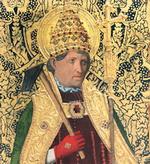Fathers of the Church
Epistle XVI: to Eusebius, Bishop of Caesarea
by Gregory Nazianzen in Unknown | translated by Charles Gordon Browne, M.A., James Edward Swallow, M.A
Since I am addressing a man who does not love falsehood, and who is the keenest man I know at detecting it in another, however it may be twined in skilful and varied labyrinths; and, moreover, on my own part I will say it, though against the grain I do not like artifice, either, both from my natural constitution, and because God's Word has formed me so. Therefore I write what presents itself to my mind; and I beg you to excuse my plain speaking, or you will wrong the truth by depriving me of my liberty, and forcing me to restrain within myself the pain of my grief, like some secret and malignant disease. I rejoice that I have your respect (for I am a man, as some one has said before), and that I am summoned to Synods and spiritual conferences. But I am troubled at the slight which has been inflicted on my most Reverend brother Basil, and is still inflicted on him by Your Reverence; for I chose him as the companion of my life and words and highest philosophy, and he is so still; and I never had reason to regret my judgment of him. It is more temperate to speak thus of him, that I may not seem to be praising myself in admiring him. You, however, I think, by honouring me and dishonouring him, seem to be acting like a man who should with one hand stroke a man's head, and with the other hand strike him on the face; or while tearing up the foundations of a house should paint the walls and decorate the exterior. If then you will listen to me, this is what you will do, and I claim to be listened to, for this is justice. If you will pay due attention to him, he will do the like by you. And I will follow him as a shadow does the body, being of little worth and inclined to peace. For I am not so mean as to be willing in other respects to philosophize, and to be of the better part, but to overlook a matter which is the end of all our teaching, namely love; especially in regard to a Priest, and one of so high a character, and one whom I know of all my acquaintances to be the best both in life and doctrine and conduct. For my pain shall not obscure the truth.
Taken from "The Early Church Fathers and Other Works" originally published by Wm. B. Eerdmans Pub. Co. in English in Edinburgh, Scotland, beginning in 1867. (LNPF II/VII, Schaff and Wace). The digital version is by The Electronic Bible Society, P.O. Box 701356, Dallas, TX 75370, 214-407-WORD.






